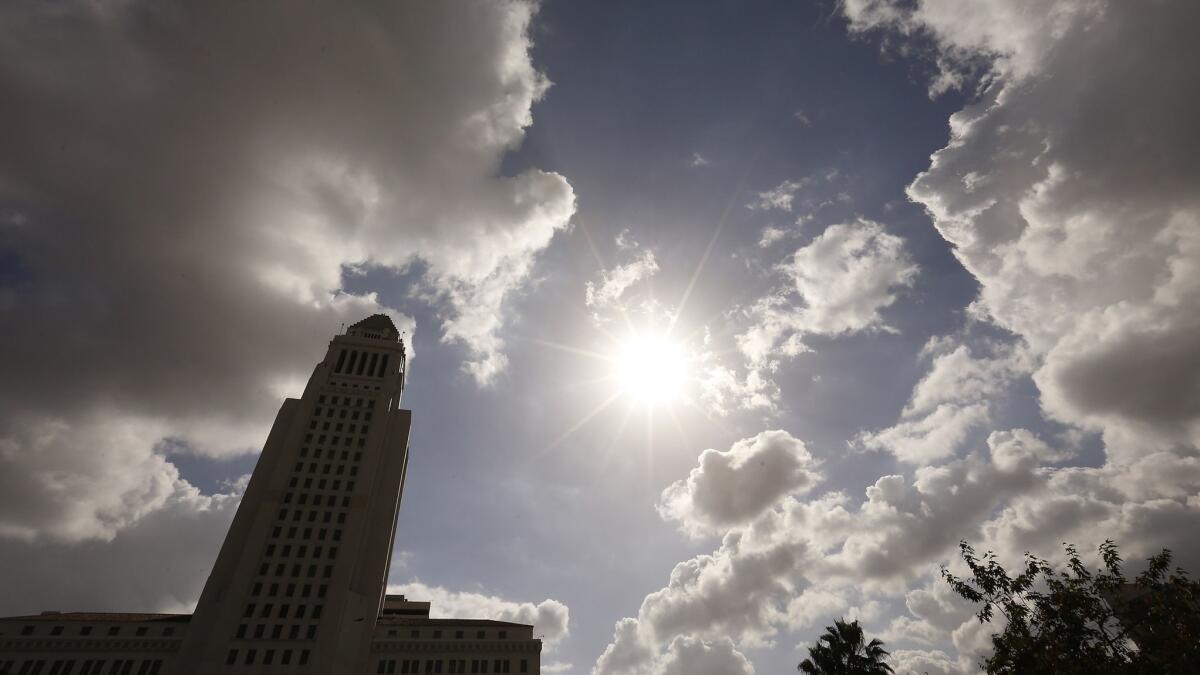Editorial: Los Angeles should give a bigger voice to small campaign donors

Los Angeles voters have decided to hold city elections on the same dates as higher-turnout presidential and gubernatorial elections, starting in 2020. The upside is that more people are likely to cast ballots for city candidates and possibly get involved in local politics, which is often where people feel the most direct impact of government.
The downside is that those same candidates will be competing with state and federal office-seekers for campaign contributions, staff and public attention. The higher cost of campaigning means candidates might have to spend more time raising money than meeting constituents — just the kind of trade-off that turns off some qualified candidates, as well as potential voters.
That’s why a proposal to significantly increase Los Angeles’ public financing for city campaigns couldn’t come at a better time.
The City Council is considering new rules that would allow qualified candidates to receive $6 in public funds for every $1 they raise from city residents. That 6:1 match, which would stretch a $115 donation from a city resident into the maximum $800 donation to a council candidate, would be among the most generous in the nation, on par with programs in New York City and Berkeley.
The effect of increasing the match (which now ranges from 1:1 to 4:1), advocates say, is that candidates don’t have to spend as much time wooing wealthy donors or special interests willing to write big checks. They can focus more on community-level outreach and cultivating small donors, and still raise enough money to run a serious campaign.
(Of course, there’s nothing to stop independent expenditure committees, which have played an increasing role in local campaigns, from spending unlimited funds in support of a candidate. But that’s a problem beyond the reach of local authorities.)
The city already pays roughly $3 million a year into a trust fund for subsidizing city candidates, and this proposal would not change that. Instead, it would start to draw down the $20 million that has accumulated in the fund. If the demand for matching dollars threatened to overwhelm the fund, the city would be required to set a smaller maximum matching grant.
The city would still limit the amount of matching funds a candidate could receive, although the proposal would boost the caps by about 50% to reflect the growing cost of running for office. Under the proposal, a council candidate could collect up to $340,000 and a mayoral candidate $2.2 million in the primary and general elections combined.
Enter the Fray: First takes on the news of the minute from L.A. Times Opinion
The proposal would also make it easier to qualify for matching funds. Currently, candidates qualify by collecting 200 contributions of $5 or more from people living in the communities they would represent. The purpose is to ensure that candidates receiving public dollars are viable and have a base of support. But the threshold proved too high in less affluent districts, and it was time-consuming for Ethics Commission staff to process and verify all those contributions.
The new proposal would lower the requirement to 100 contributions. That’s a reasonable adjustment. Plus, candidates would still have to clear a big hurdle before receiving a dime of matching funds: They would first have to raise a significant amount of cash ($25,000 for council candidates and $150,000 for mayoral candidates).
One other notable change is that candidates who take public matching funds would be required to participate in a debate or a town hall. The current rules require candidates to agree to take part in a debate, but they don’t actually have to participate in a debate to get the money. The reason was that the city didn’t want to penalize publicly-funded candidates if their privately-funded opponents refused to debate. It was a loophole in spirit that allowed candidates, especially incumbents, to take public financing and then fail to debate. The new rule would be much stricter by requiring candidates to take part in either debates or question-and-answer sessions that are open to the public and the media. That’s important — if candidates are going to take public funds to run for elected office, they shouldn’t be allowed to run from the public’s questions.
It’s worth noting that the Ethics Commission proposed these changes to the public matching fund system in 2015. Political reform is a slow and often imperfect process. The City Council should move swiftly now to make it easier for candidates to run for local office and to give a bigger voice to small donors.
More to Read
A cure for the common opinion
Get thought-provoking perspectives with our weekly newsletter.
You may occasionally receive promotional content from the Los Angeles Times.










